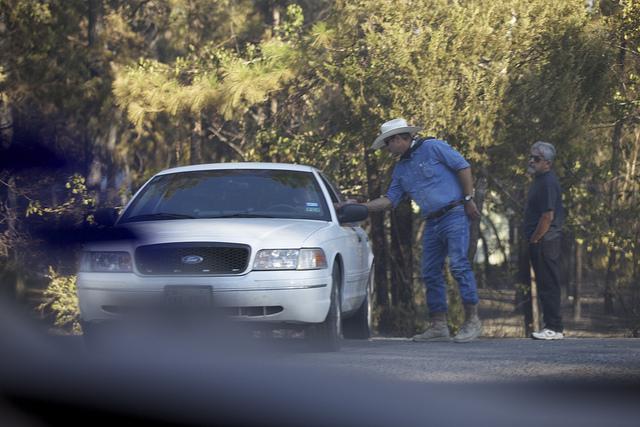After Hearing Concerns about ICE, Texas Sheriff Ran Apparent Traffic Sting That Led to Deportation Proceedings
A community group met with the Bastrop County sheriff in an effort to build trust between the sheriff’s office and the immigrant community. Then, the sheriff ran a sting that led to more than one dozen arrestees being handed over to ICE.

Just weeks after members of Texas-based community group Bastrop Interfaith met with Sheriff Maurice Cook to express concerns about their neighborhoods (illegal dumping, speeding, minor theft) and to begin a dialogue about law enforcement’s relationship with immigrants, Cook presided over an apparent “zero tolerance” traffic sting. During the operation, 63 people were pulled over for traffic offenses, of whom 24 were arrested for offenses such as driving without a license and DWI. Thirteen of those arrested were handed over to ICE for deportation proceedings.
Bastrop Interfaith, which is in Bastrop County, comprises local churches, schools, and clinics. Edie Clark, a leader with the group, told The Appeal that although some members had law enforcement-related concerns, the primary purpose of the meeting with Cook was to build trust between the sheriff’s office and the immigrant community. Clark said the group specifically sought to draw attention to a New York Times article that detailed how undocumented women are often hesitant to report domestic violence because they fear deportation.
But on June 23, three weeks after the meeting, Cook carried out the traffic enforcement operation in predominantly Latinx Bastrop neighborhood of Del Valle. Clark says that Cook even brought in additional law enforcement personnel, including state troopers, which resulted in 63 people being pulled over for traffic violations, most of which were minor. According to Clark, all but one of the 24 arrested had Hispanic surnames.
Clark says that the operation left Bastrop’s Latinx community frightened. “People are afraid to drive or go the grocery store,” she said, “School is out and parents are scared about their children playing outside.”
Their fear is not unfounded: Operations like the one conducted by Sheriff Cook feed President Trump’s deportation machine. As journalist Jorge Rivas noted, “the vast majority of immigrants are transferred to ICE custody from other law enforcement agencies—not as a result of ICE agents knocking on someone’s door seeking to arrest the person that lives there.”
On July 3, Cook, who is a Republican and a former head of the Texas Rangers, released a statement regarding the operation, saying “the only target of the initiative was traffic law violations and the results prove how badly it was needed. The initiative had nothing to do with immigration.” Cook further claimed that the 24 people were arrested “because of the seriousness of the offenses” and that two arrests were connected to the apprehension of a fugitive.
But at least two people were arrested for minor traffic violations. Jacqueline Benitez-Quintana was pulled over for failing to use turn signal and arrested for driving without a license. Eugenio Orozco was ticketed by the same officer for an obscured license plate and then taken into custody for failure to display a driver’s license upon the request of a peace officer. Orozco had a valid license, but presented the officer with his Mexican ID card.
Under Texas law, officers aren’t compelled to arrest individuals for driving without a license and can issue citations instead. The state does not offer licenses to undocumented immigrants.
Carlos González Gutiérrez, Mexico’s consul general in Austin, says at least one of those arrested said that he was questioned about his citizenship; others said they were asked where they were born. Gonzalez also pointed out that the arrests occurred on the day that Mexico bested South Korea in the World Cup and that several people ticketed were wearing the Mexico team’s jerseys. Cook has denied that anyone was asked about their citizenship.
On July 12, Bastrop Interfaith met with Cook to express its frustration and anxiety over the operation. “People were already afraid to report crimes,” said Clark. “And now it’s gotten worse.”
